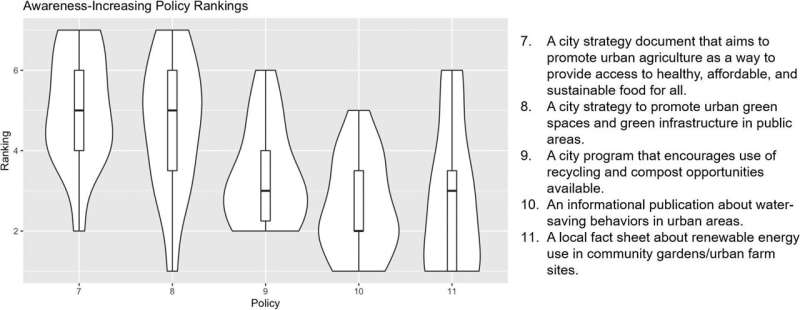This article has been reviewed according to Science X's editorial process and policies. Editors have highlighted the following attributes while ensuring the content's credibility:
fact-checked
trusted source
proofread
Study examines role of urban agriculture in food-energy-water nexus policies

A new paper in Landscape and Urban Planning examines policies to advance urban agriculture that address the food-energy-water (FEW) nexus, the complex relationships among the flows of food, energy and water in cities.
As urban agriculture becomes more prevalent, policies have been established to regulate and support the practice. In this study, a research team including Associate Professor Nevin Cohen and Adjunct Assistant Professor Rositsa T. Ilieva characterize existing FEW nexus policies based on policy data from five case study cities in Europe and the U.S. to analyze their relationships to urban agriculture and to identify policy types that support resource-efficient practices.
The researchers found that despite extensive evidence of the importance of the interconnections among resources, urban policies have seldom considered food, energy and water together, largely due to siloed decision-making bodies that lead to compartmentalized policies.
An analysis of policy data from Dortmund, Gorz´ow Wielkopolski, London, Nantes, and New York City found that the number, type and degree of support for nexus policies vary among the cities. Most urban agriculture policies are implemented at the local scale, and few incorporated all elements of the nexus.
However, many nexus policies indirectly include urban agriculture, such as policy in New York City requiring new buildings, or those undergoing major renovations, to have roofs covered by either solar panels or a green roof system. This regulation simultaneously addresses stormwater management, energy conservation and opportunities for rooftop food production where suitable.
"The study shows that urban policymakers ought to consider the FEW nexus to promote resource efficiency and sustainability as they try to support and expand urban farms and community gardens," says Dr. Cohen.
"Our paper highlights the importance of comparative cross-country research given the global nature of climate-related challenges affecting local communities," Dr. Ilieva emphasizes. "By highlighting pioneering urban agriculture strategies within municipal food-energy-water policies worldwide, we can help policymakers leverage the power of new and existing public policies to address these interconnected issues in tandem."
More information: Runrid Fox-Kämper et al, The role of urban agriculture in food-energy-water nexus policies: Insights from Europe and the U.S, Landscape and Urban Planning (2023). DOI: 10.1016/j.landurbplan.2023.104848
Provided by The City University of New York





















